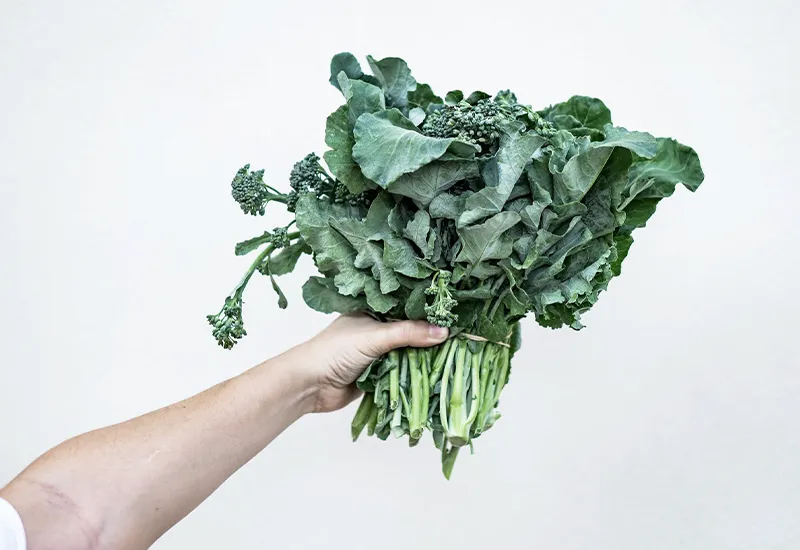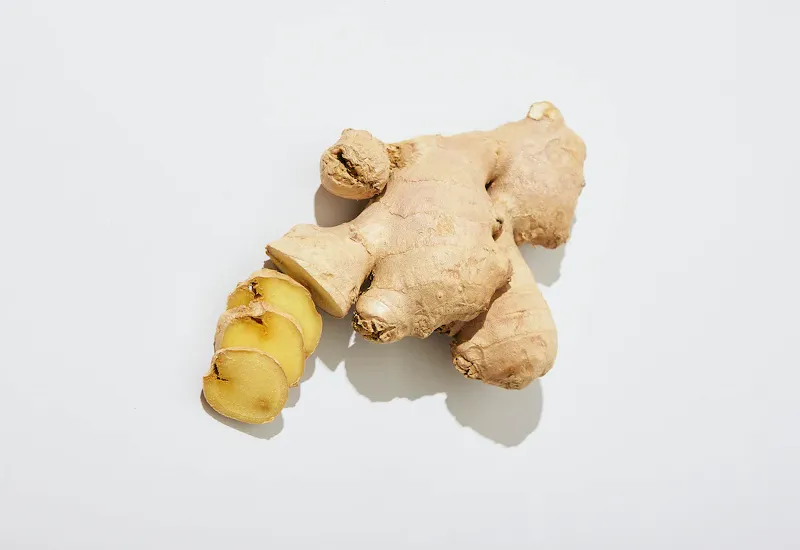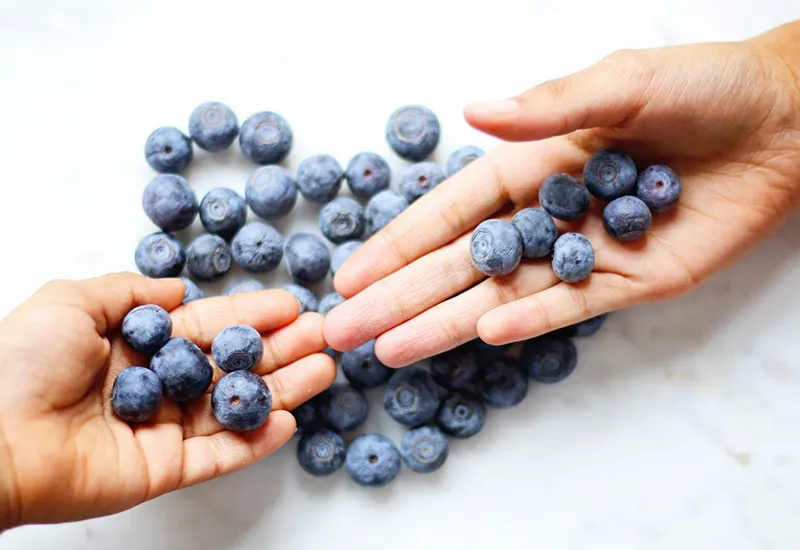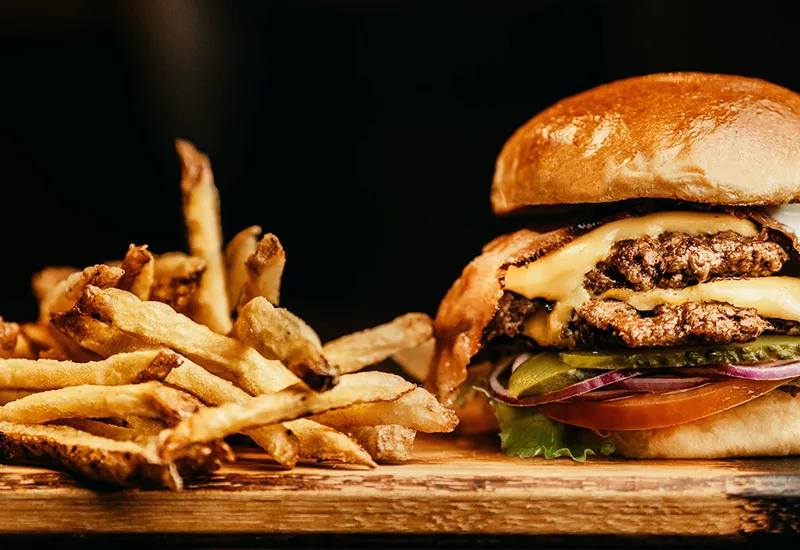Looking for the most valuable foods for a heart-healthy diet? Then you've come to the right place! Our heart is a hollow muscle and is one of the most important organs of the human body. With every heartbeat, it pumps about 80 milliliters of oxygen-rich blood into the arteries of the systemic circulation. That's 10 liters of blood a day - for a lifetime.₁
However, pre-existing conditions and one's lifestyle can interfere with the work of the heart, as well as the normal Heart rate and lead, for example, to cardiac insufficiency, cardiac arrhythmias, heart attacks or palpitations. Go to Heart disease prevention is advised above all to get plenty of exercise, consciously balance stress, have preventive checkups, and also to eat a balanced, healthy diet. Above all, what we eat and drink every day is crucial for heart health.
In this article, I would like to give you the most important tips for heart-healthy eating. You'll learn which nutrients and foods are particularly heart-friendly and which products will harm your organ in the short or long term. Let's go!
Here you can find a short overview in advance:
Notice: This article is not a substitute for medical advice, but only provides general information about heart-healthy eating. Please consult your doctor if you feel unwell or want to prevent health problems with medical care.
Nutrients: What characterizes heart-healthy diets and foods for the heart?

There are, of course, far more heart-healthy foods than I can introduce you to in this article. Therefore, it is first fundamentally important to know which essential substances make the corresponding products so healthy - and what tends to have a counterproductive effect.
Which food ingredients are particularly important and good for the heart?
- Omega-3 fatty acids
- Niacin
- Dietary fiber
- Antioxidants
- Unsaturated fatty acids
- Vitamin D
- Vitamin B12
- Magnesium
- Coenzyme Q10
- Potassium
- Folic acid
- Vitamin K
- Secondary plant substances
- …
Which food ingredients are harmful to heart health?
- Trans fats
- Saturated fatty acids
- Refined sugar
- High salt content
- Simple carbohydrates
- Artificial additives
- Preservatives
- Alcohol
- …
Food: What should you eat in a healthy diet for the heart?

Now we can relax and move on to the specific foods that contain many of the most important nutrients for a healthy heart. The following agricultural products you should eat necessarily more oftenif you want to prevent possible dangerous heart diseases.
Important: Some sea fish, such as salmon, herring, mackerel or tuna, are rich in omega-3 fatty acids and therefore quite healthy for the heart. But since there are plant-based alternatives, fish sentient animals are and we are the Stop overfishing of the seas want, the focus in this article is on vegan foods.
1. kale
Kale is especially rich in antioxidants, vitamin K, Vitamin C and dietary fiber. These nutrients help reduce inflammation and promote heart health. Vitamin K in particular protects the arteries and promotes blood clotting.₂
2. tomatoes
Tomatoes contain besides vitamins and fiber also lycopene, a plant substance with strong antioxidant properties. Low levels of lycopene in the blood were already scientific associated with an increased risk of heart attacks and strokes.
3. olive oil
Olive oil is rich in simple unsaturated fatty acids and antioxidantsthat reduce inflammation and promote heart health. The popular food can be used in many dishes and can help reduce your cholesterol and blood pressure - not to mention the risk of heart disease.₃
4. avocado
Avocados contain mainly unsaturated fatty acids, dietary fiber and potassium. These substances in the heart-healthy fruit have lipid-lowering and cardioprotective effects, and can also promote heart health.₄.
-
Vegan on the job15 €
-
Cooking for the climate18 €
-
Vegan cliché Adé25 €
5. carrots
By eating carrots more often, you take especially Beta-carotene, vitamin A, potassium and fiber on. Since these nutrients keep the blood vessels healthy, the vegetable naturally cannot be missing from the list of heart-healthy foods.
6. broccoli
Among other things, broccoli is rich in Dietary fiber, magnesium, potassium and Vitamin K. Vitamin K deficiency in particular is often associated with atherosclerosis. Broccoli is therefore also one of the most important foods for the heart.
7. watermelon
Melons are rich in Vitamins, minerals and antioxidants. Using the with the Lycopene extract it also reduces oxidative stress and thus counteracts cardiovascular diseases. In addition, support heart health by reducing inflammation and regulating blood pressure.
8. ginger

Among other things, ginger is rich in Potassium and magnesium and has anti-inflammatory as well as antioxidant properties. It can help lower blood pressure and prevent the formation of blood clots. Therefore, the versatile, healthy tuber should not be missing from a heart-healthy food list.
9. onions
Onions are also part of a healthy diet for the heart. They contain valuable Antioxidants, as well as Magnesium and potassium and can help lower cholesterol levels. If you want to live a heart-healthier life, you should especially include red onions in your meals more often.
10. garlic
The consumption of garlic acts disinfecting, blood thinning, blood pressure and cholesterol lowering and can improve blood flow to the coronary arteries. Also, because garlic helps lower blood lipid levels, the bulb is one of the most effective foods against heart disease.
11. asparagus
Asparagus is rich in Vitamins, potassium and antioxidants, drains the body, reduces the "metabolic waste" homocysteine, lowers blood pressure and ensures a regular heartbeat. Finally, eating asparagus can also reduce dangerous inflammation and lower the risk of heart disease. A versatile food for a truly heart-healthy diet.
12. pumpkin
Fortunately, pumpkins are rich in fiber, vitamins and Potassium and can therefore alleviate cardiac arrhythmias and other heart problems. You can also prevent the formation of blood clots, which can trigger heart attacks, by eating pumpkin regularly.
13. sauerkraut
When it comes to nutrition tips for a healthy heart, sauerkraut cannot be missed. The fermented food contains valuable Probiotics, as well as and vitamin C and potassium. Consumption supports heart health by minimizing inflammatory processes and regulating blood pressure.
14. linseed oil
Organic linseed oil (but also hemp oil or algae oil) has anti-inflammatory and antibacterial effects and has Omega-3 fatty acidsthat reduce inflammation and promote heart health. Especially α-linolenic acid helps blood formation and helps reduce blood pressure and cholesterol levels. It can help lower blood pressure and cholesterol levels.
15. sprouts
Sprouts are also medicinal food because they are rich in Vitamins, minerals and antioxidants are. By making them a regular guest on your menu, you'll ensure, among other things, that you reduce LDL cholesterol levels to protect your cardiovascular system.
16. berries

Especially blueberries, blackberries, strawberries and black raspberries are rich in Antioxidants, vitamins, fiber. They are among the best sources of phytochemicals and help, for example, in the natural lowering of blood pressure. So if you want to protect your heart, these berries should ideally already be a valuable part of your daily breakfast.
17. whole grain products
Whole grain products (e.g. quinoa, bulgur, whole grain pasta or millet) are rich in Dietary fiberthat lower cholesterol and promote your heart health. They also contain important B vitamins and can, According to studiesimprove cholesterol levels in your blood and minimize the risk of heart disease.
18. legumes
Legumes such as peas, beans and lentils, but also soybeans and chickpeas, are valuable sources of protein and contain above all Dietary fiber, potassium and magnesium. They are a great meat substitute, can lower blood pressure, regulate LDL cholesterol levels and significantly reduce the risk of suffering from heart disease.
19. oatmeal
Rolled oats also have large quantities of soluble Dietary fiber and healthy fiber, protein and magnesium. Eating them regularly (for example, at breakfast with some soy yogurt) helps lower your cholesterol. They also promote your heart health because they keep you full for a long time and thus prevent cravings and obesity.
20. nuts
Nuts are rich in Protein, fiber, magnesium, vitamin E, antioxidants and healthy fats.. Walnuts and almonds in particular contain large amounts of omega-3 polyunsaturated fatty acids. These can, among other things, reduce dangerous vascular deposits and protect you from a heart attack. Nuts also serve as a healthy snack for in-between meals and are therefore also an ideal food for a heart-healthy diet.₅
Heart healthy recipes with the most important foods for the heart
Especially the above-mentioned foods should be integrated into your meals more often to protect your heart and blood vessels. You still lack inspiration? Here, I've just picked out three heart-healthy recipes for delicious meals you can cook to get you off to a good start:
- Grilled tofu and asparagus with ginger cauliflower rice
- Dill carrots with fennel and spring onions
- Broccoli curry with coconut milk, carrots and chickpeas
- …
What recipes can you recommend? I welcome your ideas and suggestions in the comments.
NoGos: Which foods are bad for heart health?

A heart-healthy diet must also not be perfect. Of course, you can indulge your cravings now and then. Nevertheless, it is of course also good to know which (especially processed) foods you should eat less often or not at all, because they can harm your heart health. Therefore, I have compiled a small list of foods that are harmful to the heart.
1. red meat
Red meat is rich in cholesterol and produces harmful substances that promote blood clotting can. This is another reason why the risk of heart attack increases, for example, through the regular consumption of beef steak or pork chops, such as Nutritionists:inside found out.₆
2. sausage
Sausages often contain saturated fatty acids and salt, which can increase the risk of heart disease. Eating a large slice of ham, bacon and sausages (50 grams) every day increases the risk of cardiovascular disease by 42 percent.₆
3. fast food and fried food
Fast food and fried food are especially rich in trans fats and salt. Regular consumption also increases the risk of obesity, high blood pressure, heart attacks and strokes many times over and is therefore not part of a heart-healthy diet.₇
4. ready meals
Ready meals often contain high amounts of salt, sugar, unhealthy fats and artificial additiveswhich can put a strain on the heart. According to studies, each portion increases the likelihood of suffering from cardiovascular disease.₈
5. margarine
Anyone who wants to eat heart-healthy should, if possible, also take into account the Trans fats from margarine, as even one teaspoon a day can increase the risk of coronary heart disease by 10 percent in the future.₉
6. sweets
Sweets usually contain a lot of refined sugar and are addictive. Since sugar increases the risk of cardiovascular disease, it absolutely does not fit in with a heart-healthy diet.₁₀
7. alcohol
To prevent heart problems you should drink a lot, but water and no alcoholic beverages. Excessive, regular alcohol consumption increases blood pressure, among other things, leads to inflammatory reactions in the body and can trigger cardiac arrhythmias. In addition, it also increases the risk of heart disease because it disturbs sleep at night, leads to breathing pauses, and thus increases the risk of atrial fibrillation.₁₁
8. soft drinks
Soft and energy drinks contain a lot of sugar and caffeine, respectively, and deplete the body of potassium. A low potassium level in the blood can lead to heart rhythm disorders and in the worst case lead to cardiac arrest. They also increase the risk of obesity, elevated blood sugar levels and poor cholesterol levels - common causes of heart disease.
Frequently asked questions about nutrition for the heart
What should you not eat if you have heart problems?
In order to prevent heart problems and in case of existing heart problems, one should especially take into account the Limit consumption of saturated fats, trans fats, salt, sugar and alcohol. Avoid processed foods, fast foods and fried foods, among others.
What is the healthiest thing for the heart?
The healthiest for the heart are foods that are Rich in omega-3 fatty acids, fiber, antioxidants, and heart-healthy minerals are. Examples are green leafy vegetables, nuts, oats, berries, legumes, tomatoes, carrots and onions.
What fruit is good for the heart?
Heart healthy fruits are for example Berries, apples, citrus fruits, bananas and grapes. They are rich in fiber, vitamins and antioxidants that promote heart health.
Heart healthy diet, made easy!

Eating a heart-healthy diet is vitally important to maintaining your Reduce risk of heart disease and increase your well-being. Now you have learned about many essential nutrients and foods for the heart and can integrate them into your diet - also with the help of the suggested recipes.
"The way to health leads through the kitchen, not the pharmacy."
Sebastian Kneipp (more at Food quotes)
Finally, here I have a few further articleswith the help of which you can also promote your heart health:
- Lose weight vegan - Lose weight with a plant-based diet
- Lose weight healthily - tips for natural weight loss
- Mental regeneration - tips to really switch off
- Become more relaxed - tips for more serenity in everyday life
I sincerely hope that with this post I can help you to a stronger heart and a healthier lifestyle can help. Do you have any questions, suggestions or other foods for a healthy heart that should definitely be mentioned here? Then I look forward to your comment.
Stay healthy,

PS: Still not quite sure why the all-plant diet is so beneficial? Here I present you my Reasons for the vegan lifestyle in front of - moreover I can give you this vegan documentaries which have already opened the eyes of many people.
References
₁ P. Rosenkranz: Circulation, pulse and blood pressure measurement (as of 08.03.2021), available at https://www.planet-wissen.de/natur/anatomie_des_menschen/blut_saft_des_lebens/pwiekreislaufpulsundblutdruckmessung100.html. [08.05.2023].
₂ K. Maresz (2015): Proper Calcium Use: Vitamin K2 as a Promoter of Bone and Cardiovascular Health, available at https://www.ncbi.nlm.nih.gov/pmc/articles/PMC4566462. [08.05.2023].
₃ M. Guasch-Ferré, D. B. Hu, M. A Martínez-González (2014): Olive oil intake and risk of cardiovascular disease and mortality in the PREDIMED Study, available at https://pubmed.ncbi.nlm.nih.gov/24886626 [08.05.2023].
₄ J. Tabeshpour 1 2 , B. M. Razavi 3 , H. Hosseinzadeh (2017): Effects of Avocado (Persea americana) on Metabolic Syndrome: A Comprehensive Systematic Review, available at https://pubmed.ncbi.nlm.nih.gov/28393409 [08.05.2023].
₅ German Medical Association: Consumption of nuts avoids cardiovascular diseases and cancer (as of 07.12.2016), available at https://www.aerzteblatt.de/nachrichten/71855/Verzehr-von-Nuessen-vermeidet-Herz-Kreislauf-Erkrankungen-und-Krebs. [08.05.2023].
₆ Focus Online: Heart Risk - All-clear for Red Meat, Beware of Sausage (as of July 30, 2014), available at https://www.focus.de/gesundheit/ernaehrung/news/entwarnung-fuer-rotes-fleisch-vorsicht-vor-der-wurst-herzrisiko_id_1762534.html. [08.05.2023].
₇ P. Qin, M. Zhang, M. Hang, et al. (2021): Fried-food consumption and risk of cardiovascular disease and all-cause mortality: a meta-analysis of observational studies, available at https://heart.bmj.com/content/early/2021/01/07/heartjnl-2020-317883.info. [08.05.2023].
₈ A. Clark: Ultra-processed food is associated with cardiovascular disease (as of Aug. 27, 2021), available at https://www.bhf.org.uk/what-we-do/news-from-the-bhf/news-archive/2021/august/ultra-processed-food-is-associated-with-cardiovascular-disease. [08.05.2023].
₉ Deutsche Apotheker Zeitung: Arzneimittel und Therapie - Koronare Herzkrankheit: Gehärtete Fette gefährden die Gesundheit (as of May 31, 1998), available at https://www.deutsche-apotheker-zeitung.de/daz-az/1998/daz-23-1998/uid-3418 [May 08, 2023].
₁₀ C. Rehberg: Sugar - Risk to the Heart (June 30, 2022), available at https://www.zentrum-der-gesundheit.de/news/gesundheit/allgemein-gesundheit/zucker-herz. [08.05.2023].
₁₁ Swiss Heart Foundation: How much alcohol can the heart tolerate? (as of 10.06.2022), available at https://swissheart.ch/wissen-und-support/dossiers/wie-viel-alkohol-vertraegt-das-herz. [08.05.2023].







